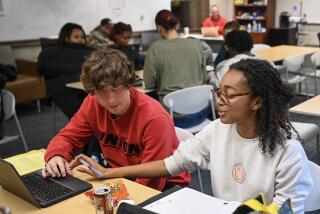Community Essay : Expert Advice on High-School Cheating : A former chronic cheater talks about who does it and which teachers it gets done to.
- Share via
Several years ago I was a guidance counselor for a strongly academic high school. The pressure to maintain a high grade point average and class ranking was intense.
One day a former grad stopped in for a visit. I liked him in spite of the fact that he was a known cheater. (People without guilt are often charming and likeable.) He had stoped by that day to ask me to keep an eye on his younger brother, a freshman who was feeling overwhelmed by the stress of a demanding school. The talk turned to cheating and I asked him if he would talk to me about it.
“Tell me about it here or anywhere,” I said.
So he did and I listened. He said I could use his name, but it became clear that he spoke for so many stressed-out high school kids that names didn’t matter.
There was no particular peer pressure to join in the cheating, but ratting on fellow classmates who cheated was not allowed. Cheating followed, at least at this school, an academic hierarchy. A 3.2 student struggling to raise her GPA to qualify for a UC school might well receive a copy of a Harvard prospect’s exam from first-period biology. A similar plea from a 3.8 student (possible competition) would fall on deaf ears. It was felt by the students that only dumb kids got caught at cheating.
There was another hierarchy in cheating: faculty acuity level. Some teachers were considered too trusting or naive to even think their students would be dishonest. This kind instructor was liked but pitied. Cheating pervaded his classroom, but was rarely noticed or punished. The next type of teacher was a pit bull on cheaters. She would concoct different tests for each period she taught and horrendous punishments. Cheating was almost as common in this type of teacher’s class; in fact some of the students viewed it as a challenge.
A rare and respected subtype was a teacher like Mrs. X, an English teacher mentioned by my student. She not only read each bit of writing her students produced but remembered each essay from all her sections, including past years. This dedicated teacher prevented traveling essays, plagiarism from magazine articles and even the sociologically interesting practice of passing down compositions among siblings. It follows that many faculty were perceived to read students’ work cursorily, if at all. (This brings back a memory of my high school physiology class where I wrote in the middle of a paper on fetal pig dissection, “Mr. W. is a weirdo”. I still got an A.)
A common method of essay cheating was to interview a student who had heroically completed her essay a few days in advance of the due date. General concepts were gleaned, along with quotable phrases from the book or literary work. Care was taken not to directly quote from the helpful student; her thoughts were simply paraphrased in vague terms.
Sets of tests were stolen regularly by student assistants, who were also renowned for lifting call slips to pull kids out of class. Teachers’ signatures were practiced with diligence until they could be written with ease. If a trusting teacher sent an aide to copy tests, one was surely held out to be spread to friends in all sections of that class.
Forgeries were perhaps at their most highly evolved in the filling out of school information cards in September. Rather than asking a parent to sign the form, the student merely wrote his own version of the parents’ signature and used it to sign his own absence notes for the rest of his school stay. My student informants say automated phone calls to homes informing parents of an absence have cut into this practice.
By the time I finished interviewing my former senior, I was numb. I said, “Tell me what you think of the cheating. Why do you do it?”
“Everybody else does it and they are going to get into good colleges. Why shouldn’t I?”
I now work in a continuation school where teachers set up individual learning packets and portfolios. Students demonstrate work as they complete it. Formal tests are rare and cheating is unusual. But at other schools, according to my students, academic dishonesty is still common. The nurturing, careful teachers still seem, unsurprisingly, to be more successful at halting the cheaters. Kids I spoke with, regardless of school district, had respect for these instructors and some said they would not cheat in their class.






